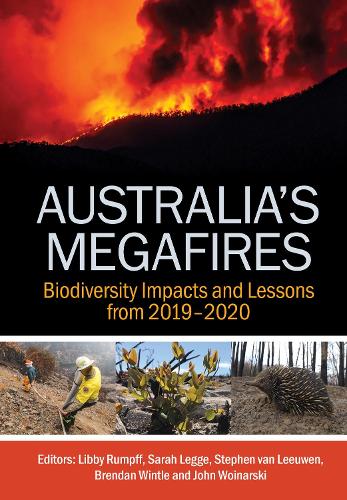
Australia's Megafires: Biodiversity Impacts and Lessons from 2019-2020
(Paperback)
Publishing Details
Australia's Megafires: Biodiversity Impacts and Lessons from 2019-2020
By (Author) Libby Rumpff
Edited by Sarah M. Legge
Edited by Stephen van Leeuwen
Edited by Brendan A. Wintle
Edited by John C.Z. Woinarski
CSIRO Publishing
CSIRO Publishing
1st February 2023
Australia
Classifications
Professional and Scholarly
Non Fiction
Biodiversity / Ecosystems
Sustainability
Wildlife: general interest
Environmental management
Climate change
363.3790994
Physical Properties
Paperback
512
Width 170mm, Height 245mm, Spine 29mm
1230g
Description
The Australian wildfires of 201920 (Black Summer) were devastating and unprecedented. These megafires burnt more than 10 million hectares, mostly of forests in southern and eastern Australia. Many of the fires were uncontrollable. These megafires affected many of Australias most important conservation areas and severely impacted threatened species and ecological communities. They were a consequence of climate change and offered a glimpse of how this is likely to continue to affect our future. Australias Megafires includes contributions by more than 200 researchers and managers with direct involvement in the management and conservation of the biodiversity affected by the Black Summer wildfires. It provides a comprehensive review of the impacts of these fires on all components of biodiversity, and on Indigenous cultural values. These fires also triggered an extraordinary and highly collaborative response by governments, NGOs, Indigenous groups, scientists, landholders and others, seeking to recover the fire-affected species and environments to restore Country. This book documents that response. It draws lessons that should be heeded to sustain that recovery and to be better prepared for the inevitable future comparable catastrophes. Such lessons are of global relevance, for wildfires increasingly threaten biodiversity and livelihoods across the globe.
Reviews
"Australias Megafires contains an outstanding amount of information and should serve as both a useful reference resource for future natural disaster events, together with bring a sombre reminder of the impact of the 2019-20 bushfires. The lessons learned have global relevance, and will support future wildfire preparedness and response efforts." * Wildlife Health Australia *
"[Australia's Megafires] involved contributions from more than 200 scientists and experts. It provides the most comprehensive assessment yet of how the fires affected biodiversity and Indigenous cultural values, and how nature has recovered." * The Conversation *
Author Bio
Stephen van Leeuwen is a Wardandi Noongar with a profound respect for Country, a professor and Australias first Indigenous Chair of Biodiversity and Environmental Science, based at Curtin University. He is a botanical ecologist with diverse research interests. Brendan A. Wintle is a Professor in Conservation Ecology and a Principal Investigator in the Quantitative and Applied Ecology group (QAECO) at The University of Melbourne. He is passionate about the conservation of Australias unique flora and fauna. He was a co-editor of Monitoring Threatened Species and Ecological Communities (CSIRO Publishing, 2018). John C. Z. Woinarski is a Professor of Conservation Biology at Charles Darwin University. He has been engaged in research, management and policy relating to Australian biodiversity for over 40 years. He was the author of A Bat's End (CSIRO Publishing, 2018), a co-author of Cats in Australia (CSIRO Publishing, 2019) and The Action Plan for Australian Lizards and Snakes 2017 (CSIRO Publishing, 2019), and co-editor of Recovering Australian Threatened Species (CSIRO Publishing, 2018). Libby Rumpff is a Senior Research Fellow and a Principal Investigator in the Quantitative and Applied Ecology group (QAECO) at The University of Melbourne. She is a woodland ecologist and environmental decision analyst. Sarah M. Legge is an Honorary Professor at The Australian National University, and a Professorial Fellow at Charles Darwin University. Sarah is a wildlife ecologist with 30 years of research and conservation management experience. She was a co-author of Cats in Australia (CSIRO Publishing, 2019) and co-editor of Monitoring Threatened Species and Ecological Communities (CSIRO Publishing, 2018).
